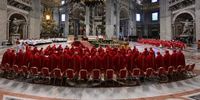As the world watches, the conclave to elect the next pope has commenced at the Vatican, following the death of Pope François on April 21, 2025. This pivotal moment in the Catholic Church's history began on May 7, 2025, with 133 cardinal electors gathering in the Sistine Chapel, a site steeped in tradition and secrecy.
The conclave follows a solemn mass at Saint Peter's Basilica, marking the beginning of a process that will continue until a new pope is elected. This year, five French cardinals are participating, one more than in the previous conclave in 2013, highlighting France's significant representation in this crucial decision-making body.
Among the cardinals is Jean-Marc Aveline, the 66-year-old archbishop of Marseille, who is seen as a fresh face in the French Church. Aveline, who was ordained as archbishop in 2019, has been a prominent advocate for intercultural dialogue and the defense of migrants—principles that resonate with the legacy of the late pope. Recently elected as head of the Conference of Bishops of France, Aveline is considered a potential candidate for the papacy, often referred to as one of the "papabili" (potential popes).
Philippe Barbarin, aged 74 and the former archbishop of Lyon, also brings his experience to the conclave. Created a cardinal in 2003 by Pope John Paul II, Barbarin has participated in previous conclaves, including those in 2005 and 2013. His tenure has not been without controversy; he faced legal challenges related to the Church's handling of sexual abuse cases, which have made him a polarizing figure.
François-Xavier Bustillo, 56, is the bishop of Ajaccio and was elevated to cardinal in September 2023. Known for his close ties with the local community and his energetic demeanor, Bustillo has expressed the need for the Church to undergo internal renewal. His rise in the Church coincided with Pope François's last visit to Corsica, adding to his profile as a notable candidate.
Dominique Mamberti, a seasoned diplomat at the Vatican, aged 73, has been instrumental in the Church's international relations. He has served in various capacities, including as the prefect of the Supreme Tribunal of the Apostolic Signature since 2014. Mamberti will have the honor of announcing the election results with the traditional "Habemus Papam" from the balcony of St. Peter's Basilica.
Lastly, Christophe Pierre, 79, who has had a distinguished diplomatic career, currently serves as the ambassador of the Holy See to the United States. He was created cardinal in 2023 and brings a wealth of experience to the conclave, having served the Church in numerous countries.
The first vote took place on the evening of May 7, but as anticipated, thick black smoke billowed from the Sistine Chapel, indicating that no decision had yet been reached regarding the new pope. Voting will continue on May 8, with two rounds scheduled for both the morning and afternoon sessions.
During the opening mass, Giovanni Battista Re, the 91-year-old dean of the College of Cardinals, emphasized the gravity of the decision at hand, urging the electors to prioritize the needs of the Church and humanity. Re stated, "We need a successor to François who can navigate this challenging and complex moment in history," underscoring the significant stakes involved in this election.
The conclave is shrouded in secrecy, with cardinals swearing an oath to maintain confidentiality. The rules are stringent; no electronic devices are permitted, and any breach of this vow could result in excommunication. This ensures that the election remains free from external influences, allowing the cardinals to deliberate on the future direction of the Church.
As the cardinals prepare to cast their votes, they have participated in 12 general congregations to discuss the Church's current challenges and the qualities needed in a new pope. With representatives from 70 countries, this conclave is notable for its diversity, reflecting the global nature of the Catholic Church.
While the average duration of recent conclaves has been around 3.2 days, the outcome remains unpredictable. The last election, which saw the election of Pope François, took just two days and five ballots, but history has shown that the process can be extended if no consensus is reached.
Once a new pope is elected, the announcement will be made with white smoke rising from the chapel, signaling to the world that the Church has a new leader. The elected pope will then appear on the balcony of St. Peter's Basilica to deliver his first apostolic blessing, marking the end of the sede vacante, or vacancy of the papal office.
As the conclave unfolds, the eyes of 1.4 billion Catholics around the world are watching closely, hoping for a leader who can guide the Church through its most pressing issues and continue the legacy of compassion and reform established by Pope François.





